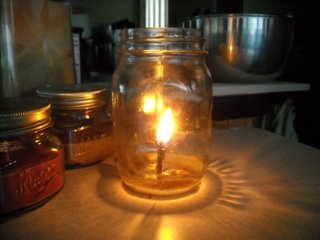 In doing a little more research on fat lamps, I decided to try making one myself using baling wire and a mason jar. Basically, the wire would be coiled and shaped so as to hold the wick (a mop head string), and a handle would be included to be able to pull out the wick and wick holder. Here’s how I did it:
In doing a little more research on fat lamps, I decided to try making one myself using baling wire and a mason jar. Basically, the wire would be coiled and shaped so as to hold the wick (a mop head string), and a handle would be included to be able to pull out the wick and wick holder. Here’s how I did it:
I wrapped the wire around a pencil. For the mop string we had though, the coil ended up too large; and so, I bent the coils to make them smaller:
This is the completed wick holder:
And here it is with the lard-saturated wick in place:
This is the wick holder and the wick now in the jar. Before I placed them in, I put several table spoons of lard into the jar and mashed them with the spoon to flatten them out:
Finally, here the lamp is lit:
Thankfully, the wick holder handle doesn’t seem to get hot when using the fat lamp.
We again are grateful for the Lord’s provisions; for Christ Jesus, the Light of the world, the Light of life (John 8:12); and for His Word, a light unto our feet and a lamp unto our paths (Psalms 119:105)!
— David
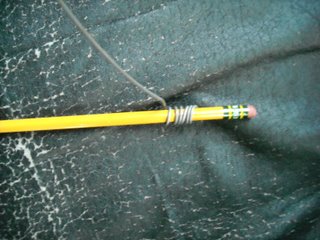
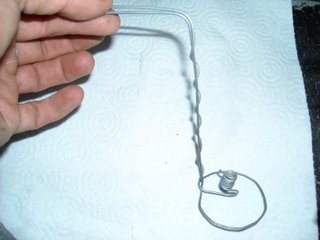
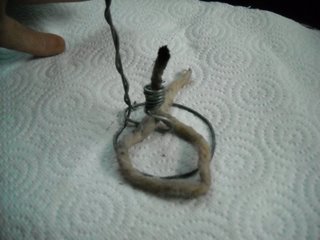
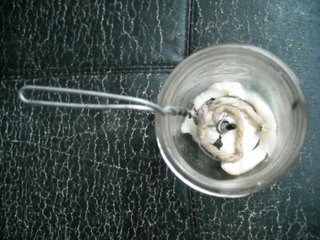
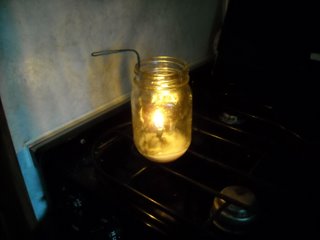
Very nice, and all with “stuff” you have on hand. All that pork lard will now be put to use for a great purpose. This is a great solution to the nightly lighting issue, and will greatly save on kerosene and other petro based chemicals.
Michael
I found a clay fat lamp at a flea market. The guy said if I rub it hard enough a genie would come out. He had no idea what it was! That’s probably why he only charged a dollar! Nice blessing for me! Now I just have to get me a pig!
Debylin
Thanks, Michael. Yes, it worked pretty well.
And very cool, Debylin!
— David
Wow, impressive.
Thanks for sharing
Short time reader…first time commenter. I have been meaning to make one of these for a while. After reading your post I ran and stole a mop string and got out my lard can. It works great! I have it next to me right now. Thanks for the info! God bless.
RH
Neat, RH!
And thanks, Aimee. We are thankful to the Lord for helping all of us start to learn about these more Him-dependent and simpler ways of doing things.
— David
We have a fireplace that we use during the winters in North GA, which would be a little colder (but by no means cold like I got in CT) than what you’re used on in TX. After a couple of years, I’m going to replace the Fireplace with a solid wood stove. Fireplaces look awesome, but stoves are superior heating appliances.
forvrin,
Thank you for the comment and the info.
— David
I went to the thrift store yesterday and they had a brand new mop head for a quarter! Then I had to explain to DH why I bought a mop head without the mop handle, LOL. This is a neat idea. I have an olive oil lamp I got from Lehmans that is basically the same except the wick is much smaller. Does the lard smell real bad when burning it? We would be using beef fat.
Beverly
Hi Beverly,
I don’t believe there was much odor with it.
Hope it works for you, and thanks for the comment.
— David
Hi David,
I do 1860's living history. Found your site, love it. I made the wire wick holder,works good at first. After a few minuets it burns down to nothing. Tried lard, veg oil, and olive oil. Please tell me what I might be doing wrong. God bless you guys. Keep doing the Lords work.
Kenny
Hi Kenny,
Thank you.
Well, we've only tried lard, by which I mean rendered pig fat. I drenched the wick in the lard before putting it into the wick, and the wick holder was pretty low, which kept the flame fairly near the lard in the jar. Maybe your wick is too far up from the lard/oils? One of the problems with these kinds of lamps, and why oils and lard won't work in "normal" oil lamps, is too much (or lack of, don't know which way it goes) viscosity (ie. there is too much resistance to the liquid flowing).
I haven't really done much other testing with this homemade lamp, although when we did test it, it burned for several hours.
Hope that helps. Please let us know if you discover anything.
— David
Hi David,
Thank you for your help. I tried candle oil and it was too thin and burned down the wire. Then I did what you said and raised the oil (veg oil) level to the bottom of the wire and it's working great. I think I'm ready to take it with us to a living history. Again, thanks for your help.
Kenny
Hi Kenny,
Great! Wondered if that might be the problem. The fat lamps we purchased are basically little pans not much more than 3/4" deep, where the wick sort of just sits up and off to the side, and those worked very well; so it would make sense that the wick lower here would work too.
Anyway, glad it did. Take care, and thanks for coming back and posting your results.
— David
Hi,
I've been working on the problem regarding wicks in ancient style oil lamp systems. The wick must be salted (yes salted!). I've used regular table salt, and simply soak the wicks (made of string, paper, etc, etc…)in a bath of warm water and salt for just a few minutes. Then I let them dry overnight or in the oven @ 200 for 10 minutes. The concept is to keep the wick just above the fuel all the time, and the salt delays the wick from burning to fast! This system can be improved by using a large shallow body of fuel with the wick laying over on a ledge just above the pool. You can surf for ancient lamps and see that the people of those times figured out these problems ages and ages ago!
Love in Christ, Mike
Hi Mike,
Great! Thanks much for the info.
— David
I am wondering if using a surfactant would help with the viscosity thing? Or would it only work in water to make it more watery? I have a friend who is a chemist who makes fuel out of tallow and such. He makes motor oil and all that from it too. He works with me on my projects. What a blessing to have a friend with so much knowledge.
debbieo
Hi Debbie,
I don't know, but your friend sounds like the one to ask! 🙂 If you do, I'd be interested to hear what he says.
— David
Thank you for your wonderful insight. I made one today with a coat-hanger, a piece of denim, and vegetable oil. Thank you again and God Bless.
Hi Jennifer,
Interesting about the denim. Thanks for commenting and for the information.
— David
Have been meaning to try a "button lamp" from Laura Ingalls Wilder's The Long Winter, but saw a reference to a "fat lamp" online so decided to try it first. Thinking of Pa's reference to "newfangled kerosene," I figured that a fat lamp came before using any purchased oil or grease. Made exactly as you did using beef tallow and it works wonderfully. Not like the artificial illumination we're accustomed to but all the difference between total darkness and the ability to move around in the dark, such as to retire to bed for the evening without stumbling and falling. Thank you!
Hi Anonymous,
I'll bet the beef tallow works great! We hope to have more ourselves one day.
Glad it worked for you, and thanks for saying hello!
— David